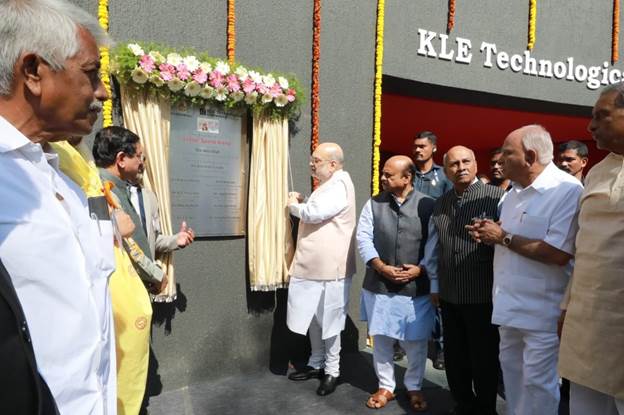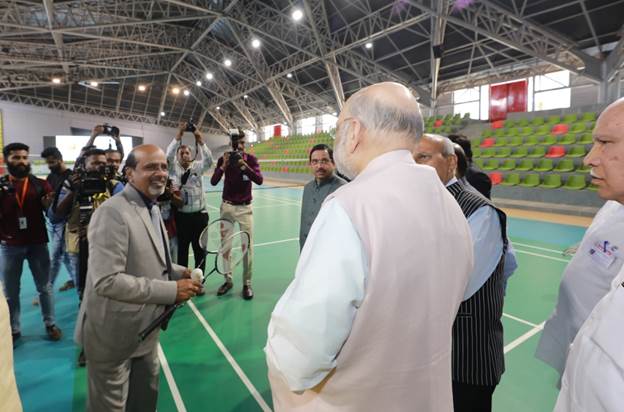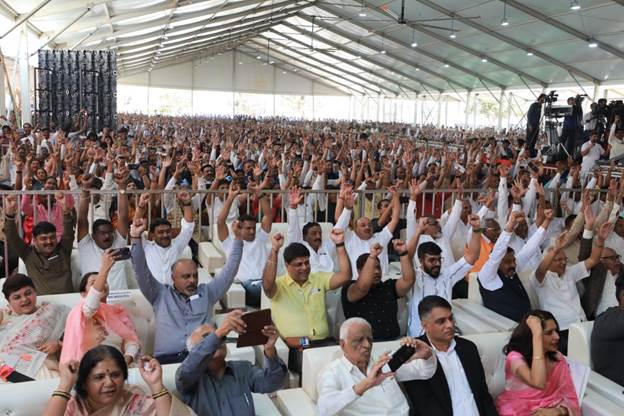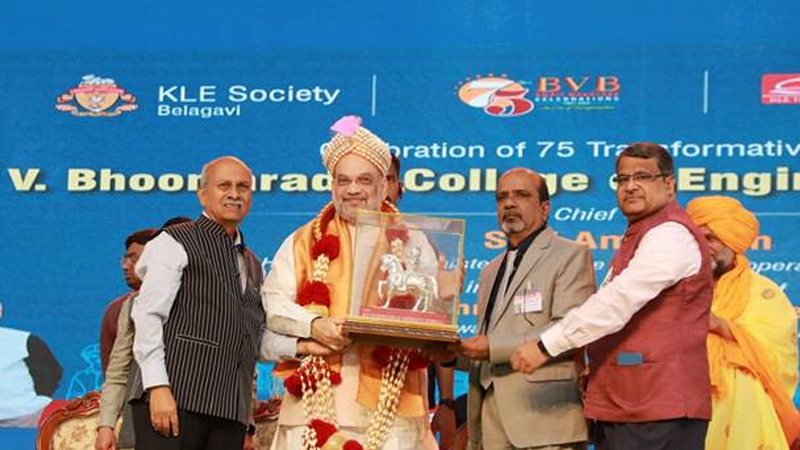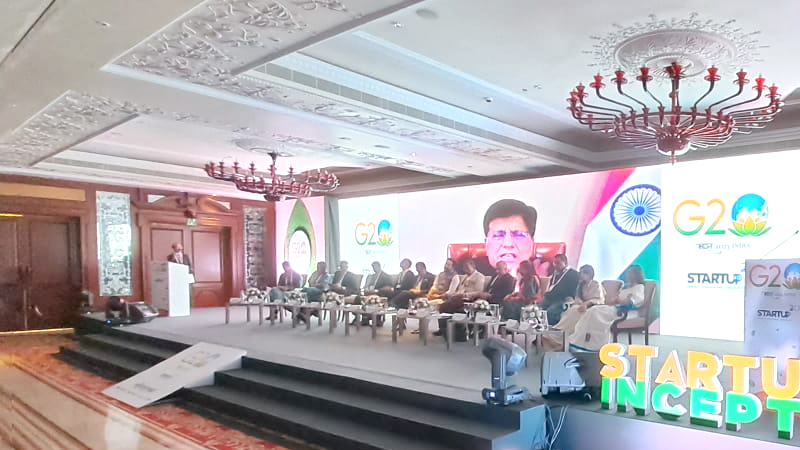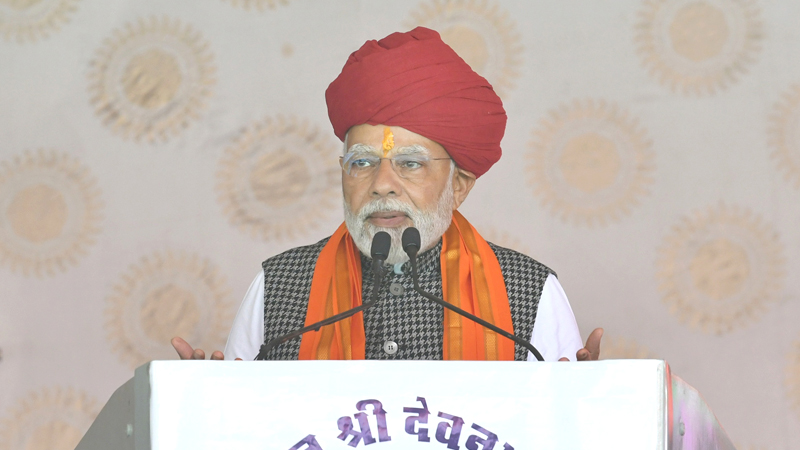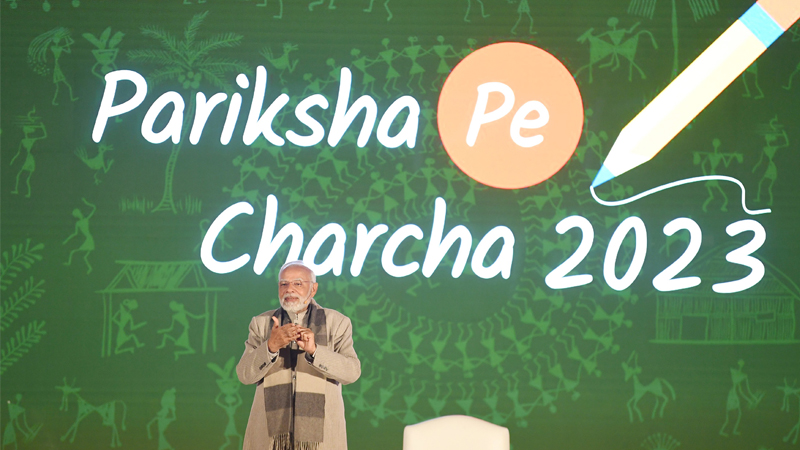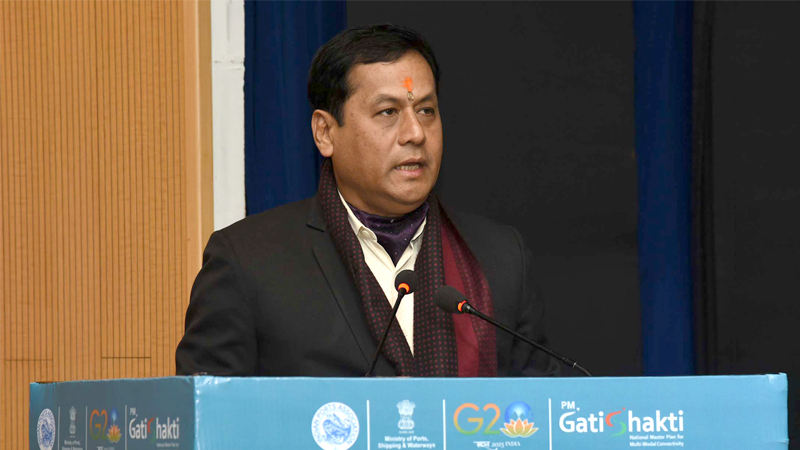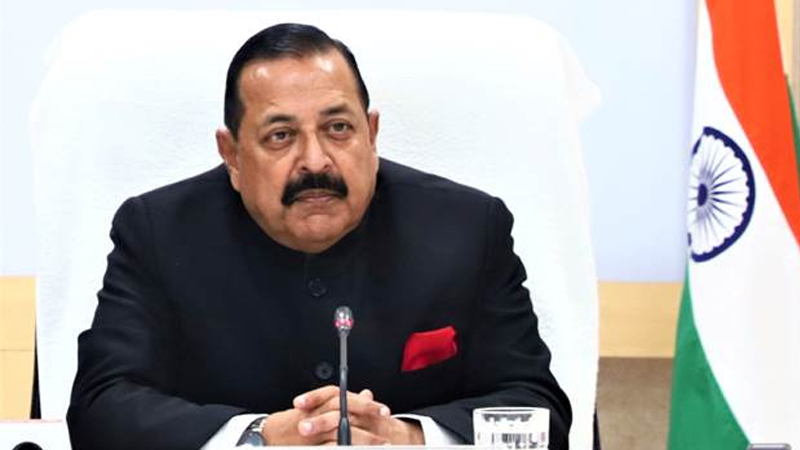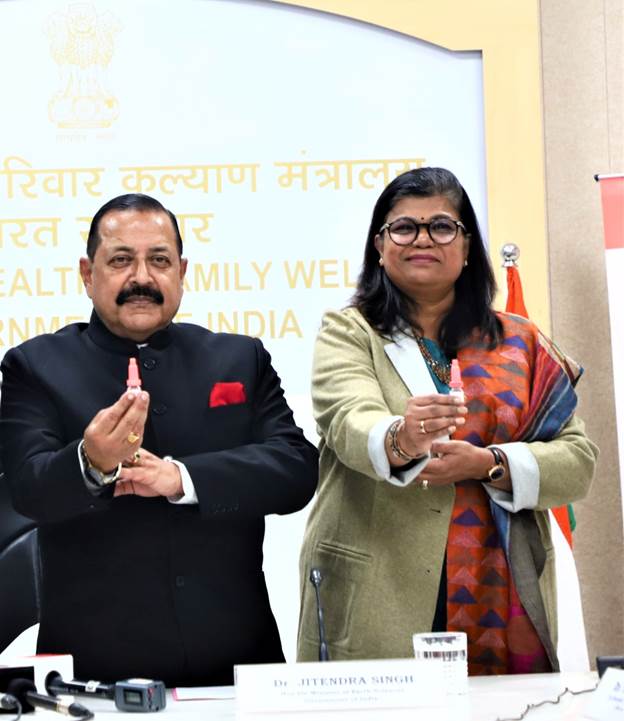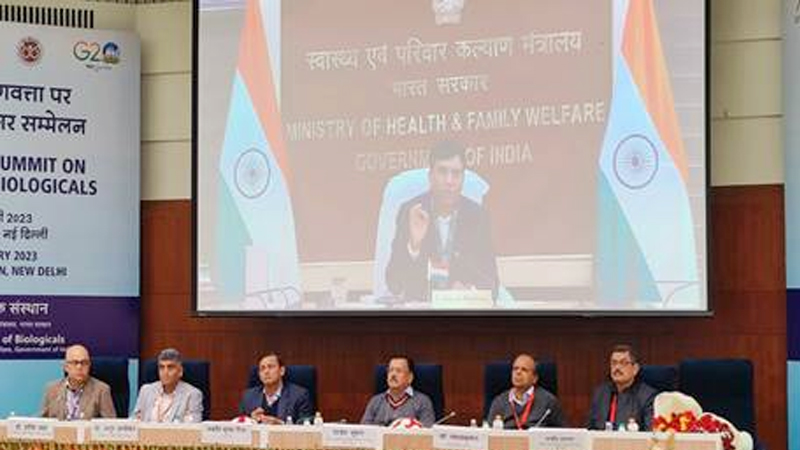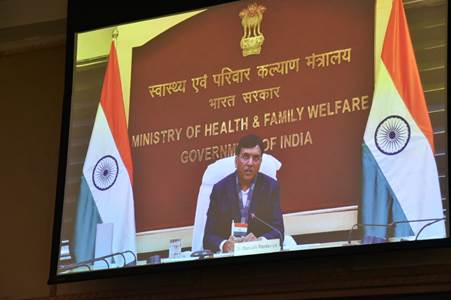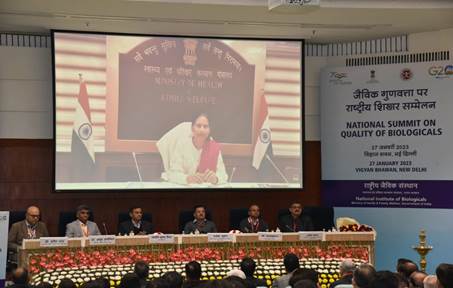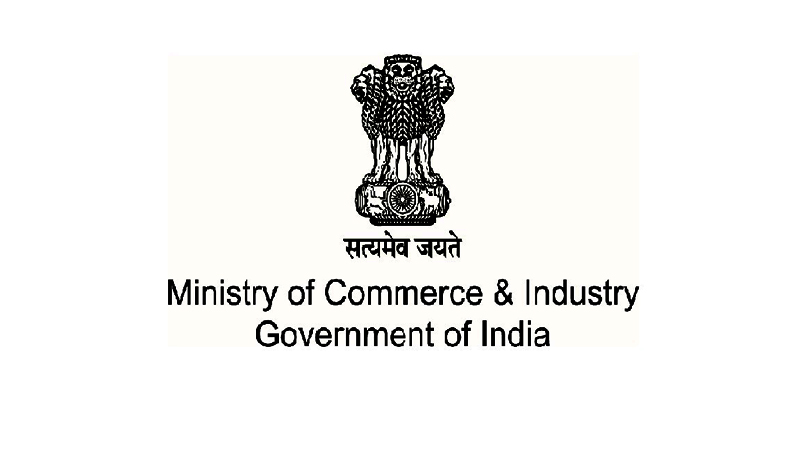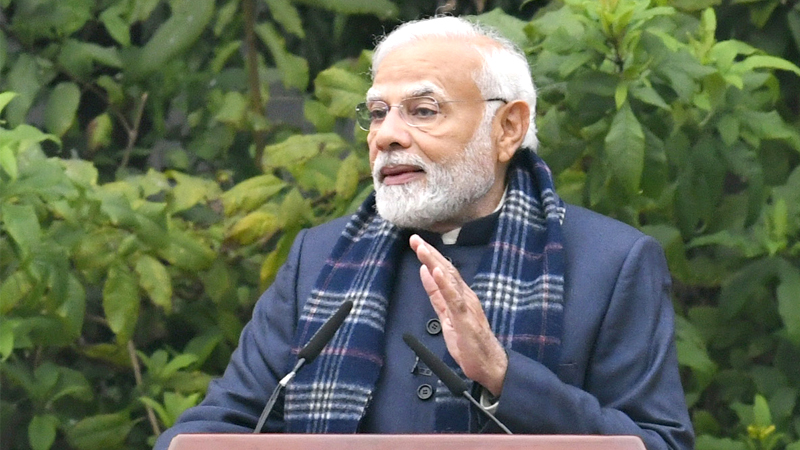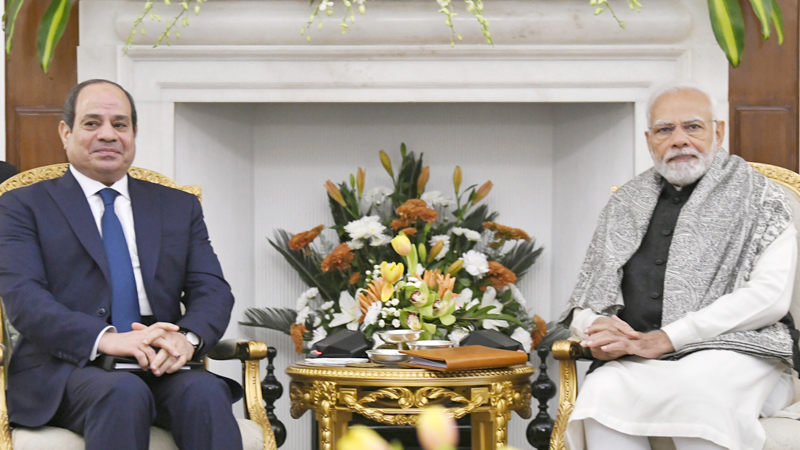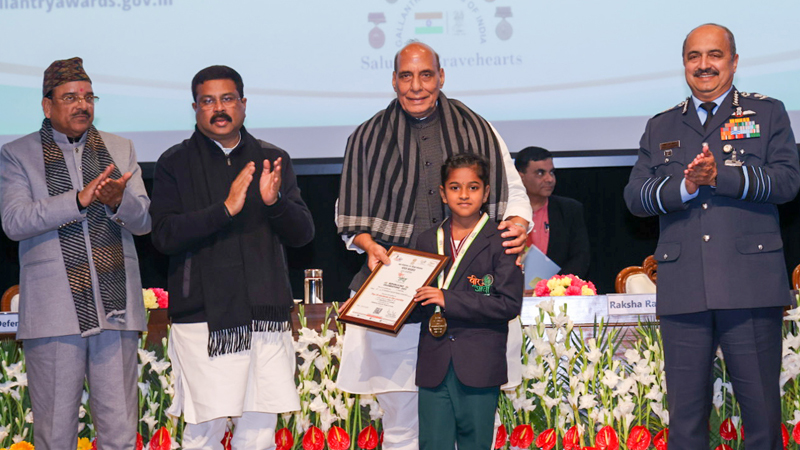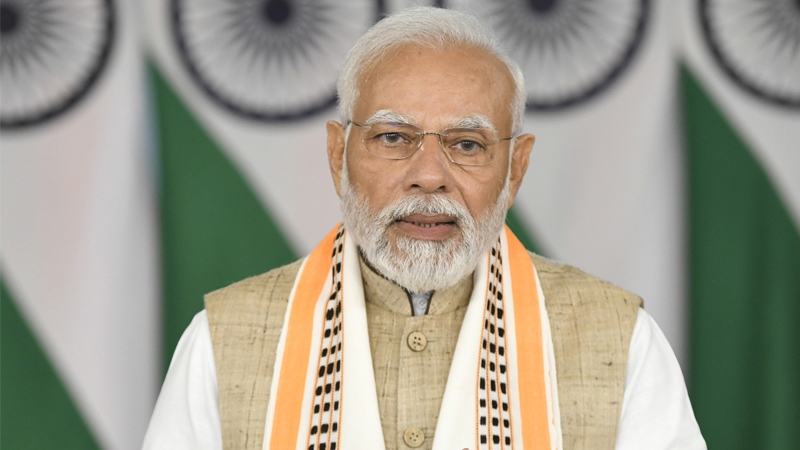In the 6th edition of Pariksha Pe Charcha (PPC), the Prime Minister, Shri Narendra Modi, interacted with students, teachers and parents today at Talkatora Stadium in New Delhi. He also witnessed the exhibits of students showcased at the venue before the interaction. Pariksha Pe Charcha has been conceptualised by the Prime Minister wherein students, parents, and teachers interact with him on various topics related to life and exams. About 38.80 Lakh registrations have taken place this year from 155 countries in this year’s edition of PPC.
Addressing the gathering, the Prime Minister highlighted that this is the first time that Pariksha Pe Charcha is taking place during the Republic Day celebrations and noted that those visiting New Delhi from other states also got a glimpse of the Republic Day. Throwing light on the importance of Pariksha Pe Charcha for the Prime Minister himself, he pointed out the millions of questions that are posed as part of the programme and said that it gives him insight into the minds of the young generations of India. “These questions are like a treasure trove for me”, the Prime Minister said. He pointed out that he would like the compilation of all these questions which can be analysed by social scientists in the coming years giving us a detailed thesis about the minds of young students at such a dynamic time.
On handling disappointment
Addressing a question regarding family disappointment in the case of poor marks from Ms Ashwini Kendriya Vidyalaya student from Madurai, Tamil Nadu, Navtej from KV, Pitampura Delhi Delhi, and Priyanka Kumari from Navin Balika School in Patna the Prime Minister said that there is nothing wrong with family expectations. However if these expectations, he said, are due to social status-related expectations then it is concerning. Shri Modi also talked about ever-increasing standards of performance and growing expectations with every success. He said it is not good to be bogged down by the surrounding web of expectation and one should look inwards and link the expectation with one’s own capabilities, needs, intentions and priorities. Giving the example of the game of cricket where the crowd keeps on rooting for fours and sixes, the Prime Minister said that a batsman who goes out to bat remains unperturbed even after so many people in the audience plead for a six or a four. Drawing the link between the focus of a batsman on a cricket field and the minds of students, the Prime Minister said that the pressure of expectations can be obliterated if you remain focused. He urged the parents to not burden their kids with expectations and asked the students to always evaluate themselves according to their potential. However, he told the students to analyse the pressures and see if they are doing justice to their own potential. In such a situation these expectations may spur better performance.
On preparation for exams and time management
Addressing the questions about not knowing where to start the preparations for the exam and the stressful situation leading to forgetfulness from Arushi Thakur a class 11th student from KV, Dalhousie, and questions about time management during exams from Aditi Diwan from Krishna Public School, Raipur the Prime Minister stressed the importance of time management in general life with or without exams. He said work never tires, in fact not working tires a person. He asked students to note down the time allotment to various things that they do. He said that it is a general tendency that one devotes more time to the things that he likes. He said while allocating time to a subject, one should take up the least interesting or most difficult subject when the mind is fresh. Instead of forcing one’s way through, students should tackle the complexities with a relaxed mindset. The Prime Minister asked if the students have observed the time management skills of mothers working at home who perform every chore in a timely manner. He also added that they barely get tired by doing all their work but also find the time to engage in some creative work in the remaining time. The Prime Minister pointed out that by observing their mothers, the students can understand the significance of micro-management of time and thereby dedicate particular hours to each and every subject. “You must distribute your time for greater benefits”, the Prime Minister remarked.
On unfair means in exams and taking shortcuts
Rupesh Kashyap, a Class 9th student from Swami Atmanand Govt School in Bastar asked about ways of avoiding unfair means in the exams. Tanmay Biswal of Konark Puri Odisha also asked about the elimination of cheating in the examination. The Prime Minister expressed happiness that students had raised the topic of finding ways to deal with malpractices during the exam and pointed out the negative change in the morals where a student takes pride in fooling the supervisor while cheating in an exam. “This is a very dangerous trend”, the Prime Minister said as he asked the society as a whole to ponder about it. He also noted that some schools or teachers who run tuition classes strive for unfair means so that their students excel in the exams. He also asked students to refrain from wasting time in finding ways and preparing cheating material and spend that time in learning. Secondly, “In these changing times, when life around us is changing, you have to face exams on every step”, the Prime Minister said as he noted that such people can only clear a few exams but eventually fail at life. “Life cannot be successful with cheating. You may clear an exam or two but it will remain questionable in life”, he added. The Prime Minister told the hard-working students not to despair at the temporary success of the cheaters and said that hard work will always benefit them in their lives. “Exams come and go but life is to be lived fully”, he said. Giving the example of people at a railway station who cross the platforms by making a way on the railway tracks instead of crossing the foot overbridge, the Prime Minister pointed out that shortcuts will not take you anywhere and said, “Shortcuts will cut you short.”
On working hard vs working smart
A student from Kozhikode Kerala asked about the need and dynamics of hard work versus smart work. Giving the example of smart work, the Prime Minister highlighted the parable of the thirsty crow who threw stones in a pitcher to quench his thirst. He emphasised the need to closely analyse and understand the work and highlighted the moral from the story of working hard, smartly. “Every work should be first examined thoroughly” he added. He gave the example of a smart working mechanic who fixed a jeep within two mins for two hundred rupees and said that it is the work experience that counts rather than the time spent working. “Everything cannot be achieved with hard labour”. Similarly, in sports also specialised training is important. He said that we should focus on what needs to be done. One should do hard work smartly and in the areas that are important.
On recognising one’s potential
Jovita Patra, a student of Class 10th from Jawahar Navodya Vidyalaya, Gurugram asked about doing well in exams as an average student. The Prime Minister appreciated the need for having a realistic assessment of oneself. Once this realisation is there, the Prime Minister said, appropriate goals and skills should be set by the student. Knowing one’s potential makes a person very capable, he said. He asked parents to do a correct assessment of their children. He said that most people are average and ordinary but when these ordinary people do extraordinary deeds, they achieve new heights. The Prime Minister said India is being seen as a new hope in the global economy. He recalled the time when Indian economists and even the Prime Minister were not seen as proficient economists but today India is seen as shining in the comparative economics of the world. “We should never be under the pressure that we are average and even if we are average there will be something extraordinary in us, all you need to do is to recognize and nurture that, ” he said.
On handling criticism
Mannat Bajwa, a student from St. Joseph Secondary School, Chandigarh, Kumkum Pratapbhai Solanki, a class 12th student from Ahmedabad and Akash Darira, a Class 12th student from Whitefield Global School, Bangalore asked the Prime Minister about tackling the people who hold negative views and opinions towards him and how it affects him. Ashtami Sen, a student of Class 11th from DAV Public School in South Sikkim also raised a similar question about tackling the critical standpoint of the media. The Prime Minister stressed that he believes in the principle that criticism is a purification yajna and the root condition of a prospering democracy. Emphasising the need for feedback, the Prime Minister gave examples of a programmer who puts up his code on open source for improvements, and companies that put up their products for sale in the market asking the customers to find the flaws in the products. He also pointed out that it is important to note who is being critical of your work. He said that parents these days have got into the habit of interrupting their kids instead of constructive criticism and urged them to break this habit as it will not mould the lives of the kids in a restrictive way. The Prime Minister also highlighted the scenes from the Parliament session when a member who is addressing the session on a certain topic doesn’t deviate even after getting interrupted by members of the opposition. Secondly, the Prime Minister also highlighted the importance of labour and research in being a critic but observed the shortcut trend in today’s day and age where most people pose allegations rather than criticism. “There is a huge gulf between allegations and criticism”, the Prime Minister remarked as he urged everyone to not mistake criticism for allegations.
On gaming and online addiction
Dipesh Ahirwar from Bhopal, Aditabh a class ten student asked his question via India TV, Kamakshi asked her question via Republic TV, and Manan Mittal via Zee TV asked questions about the addiction to online games and social media and resulting distractions. The Prime Minister said that the first decision is to decide whether you are smart or your gadget is smart. The problem starts when you start to consider the gadget as smarter than you. One’s smartness enables one to utilise the smart gadget smartly and treat them as instruments that help in productivity. He expressed concern that, as per a study, the average screen time for an Indian is up to six hours. In such a situation gadget enslaves us, he said. “God has given us free will and an independent personality and we should always be conscious about becoming slaves to our gadgets”, The Prime Minister said. He gave his own example that he is rarely seen with a mobile phone despite being very active. He said that he keeps a definite time for such activities. One should not avoid technology but restrict oneself to the things of utility as per one’s need. He also gave the example of the loss of capability for table recital among the students. The Prime Minister said that we need to improve our capabilities without losing our basic gifts. One should keep testing and learning in this era of artificial intelligence in order to preserve one’s creativity. The Prime Minister suggested ‘technology fasting’ at regular intervals. He also suggested a demarcated area as a ‘technology-free zone’ in every household. This will lead to the enhanced joy of life and you will come out of the clutches of slavery of gadgets, the Prime Minister said.
On stress after exams
Addressing the questions from Nidah, a student of class 10 from Govt Model High Secondary School, Jammu about channelising the stress from not getting the desired results even after working hard and Prashant, a class student of Shaheed Naik Rajendra Singh Rajkiya School, Palwal, Haryana asked about how stress affects the results, the Prime Minister said that the main reason for stress after exams is not accepting the truth about if the exams went well. The Prime Minister also mentioned competition among students as a stress-inducing factor and suggested that students should live and learn from themselves and their surroundings while strengthening their inner capabilities. Shedding light on the outlook towards life, the Prime Minister remarked that one exam is not the end of life and overthinking about the results should not become a thing of everyday life.
On benefits of learning new languages
Addressing questions by R Aksharasiri, a class 9th student from Jawahar Navodaya Vidyalaya Rangareddy, Telangana and Ritika, a class 12th student from Rajkiya Madhyamik Vidyalaya, Bhopal about how one can learn more languages and how it can benefit them, the Prime Minister highlighted the cultural diversity and rich heritage of India and said that it is a matter of great pride that India is home to hundreds of languages and thousands of dialects. He said that learning new languages is similar to learning a new musical instrument. “By attempting to learn a regional language, you are not just learning about the language becoming an expression but also opening the doors to the history and heritage associated with the region”, the Prime Minister said as he emphasised learning a new language without it being a burden on daily routine. Drawing an analogy where the citizens take pride in a monument of the country that was built two thousand years ago, the Prime Minister said that the country should take similar pride in the Tamil language which is known to be the oldest language on earth. The Prime Minister recalled his last address to the United Nations Organisations and highlighted how he specifically brought up facts about Tamil because he wanted to tell the world about the pride he holds for the country which is home to the oldest language. The Prime Minister highlighted the people from North India who devour the delicacies of South India and vice versa. The Prime Minister stressed the need to know at least one regional language from India other than the mother tongue and highlighted how it will brighten up the faces of people who know the language when you talk to them. The Prime Minister gave the example of an 8-year-old daughter of migrant labour in Gujarat who spoke many different languages like Bengali, Malayalam, Marathi and Gujarat. Recalling his address from the ramparts of the Red Fort on Independence Day last year, the Prime Minister threw light on taking pride in one’s heritage, one of the Panch Prans (five pledges) and said that every India should take pride in the languages of India.
On the role of teachers in motivating students
Sunanya Tripathi, a teacher from Cuttack, Odisha asked the Prime Minister about motivating students and keeping classes interesting and disciplined. The Prime Minister said that teachers should be flexible and not be too rigid about the topic and syllabus. He stressed that teachers should establish rapport with students. Teachers should always promote curiosity among students as it is their big strength. He said even today, students value their teachers a lot. That is why, said the Prime Minister, teachers should take time to say something. Regarding ways of establishing discipline, the Prime Minister said that instead of humiliating weak students, teachers should reward strong students by asking questions. Similarly, by establishing a dialogue with students with discipline issues instead of hurting their egos, their behaviour can be guided in the right direction. “I believe that we should not go the way of corporal punishment to establish discipline, we should choose dialogue and rapport”.
On the behaviour of students
Addressing the question from Smt Suman Mishra, a parent from New Delhi about the behaviour of students in society, the Prime Minister remarked that parents should not limit the scope of the behaviour of students in society. “Let there be a holistic approach to the student’s development in society. The Prime Minister advised against restricting students to a narrow sphere and encouraged an expanded circle for the students. He recalled his own advice that the students should be encouraged to travel outside after their exams and record their experiences. Setting them free like this will enable them to learn a lot. After class 12 exams they should be encouraged to go outside their states. He asked parents to keep pushing their children for new experiences. He also asked parents to be vigilant about the moods and situation of their situation. He said this happens when parents treat themselves as custodian of God’s gift i.e. children.
Concluding the address, the Prime Minister thanked everyone present on the occasion and urged parents, teachers and guardians to dilute the stressful environment that is being created during exams to the maximum extent. As a result, the exams will be transformed into a celebration filling the lives of students with enthusiasm, and it is this enthusiasm that will guarantee the excellence of students
